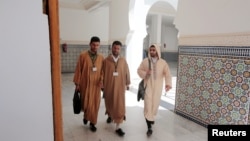Naminata Koulibaly, 30, receives training in a Moroccan Muslim teaching institute, founded by King Mohammed VI in 2015, and hopes to return to her home in Ivory Coast better equipped to advise women on religious issues.
She is one of 100 women admitted every year to study for up to three years in the institute in Rabat, run by Morocco's ministry of religious affairs.
Morocco, which is nearly 100 percent Muslim, has marketed itself as an oasis of religious tolerance in a region torn by militancy — and has offered training to imams and male and female preachers of Islam from Africa and Europe on what it describes as moderate Islam.
It currently trains 1,300 people mostly from the sub-Sahara nations of Mali, Senegal, Nigeria, Guinea, Gambia and Chad, where Al Qaeda and Islamic State are active.
"When I go back to my country, I will find some children and women who did not go to school and don't know a lot about religion, ... We will be very useful to them and we will teach them about the fundamentals of religion," said Koulibaly.
"We will show them how to behave with others and not to be extremists. We will show them how to be moderate in religion."
Compared to other countries in North Africa, Morocco has been largely insulated from militant attacks. The first since 2011 took place last December when two Scandinavian tourists were found murdered in a tourist spot in the Atlas Mountains. Four suspects had pledged allegiance to the Islamic State.
Students at the institute receive 2,000 dirhams ($208.33) a month in addition to free accommodation, plane tickets, and health insurance. Admission criteria include having a Bachelor university degree.
The curriculum covers Islamic studies along with philosophy, history of religions, sexual education, and mental health.
"We show them that the concepts of democracy and human rights serve purposes rooted in Islamic values," said institute director Abdeslam Lazaar.
Imams also receive vocational training in electrics, agriculture or tailoring to enable them to have a source of stable revenue when they return home.
Imam training can help sub-Saharan countries facing militancy and a vacuum in the supervision of religion, Salim Hmimnat of the Rabat-based African Studies Institute said.
Pope Francis visited the imam training institute during his trip to Morocco in March.
Students also come from France, such as 25-year-old Aboubakr Hmaidouch.
"The Muslim community in France is in great need of imams and female religious preachers to ensure that the values of religion contribute to living together and to the spiritual well-being of society," he said.
Training takes into account practical life and culture, and accepts diversity he said.
"When I return ... I hope to put into practice and transmit this knowledge, especially this spirit of peace, love, fraternity and tolerance."
The institute also helps Rabat expand its foothold in a region where major Moroccan banks and companies have been investing for years.
"The use of religion plays an important role in the kingdom's overall soft power equation," said Anouar Boukhars, a Maghreb expert and Carnegie Endowment fellow, noting Morocco promotes its tolerant Islam as an alternative to the extremist ideologies in the Sahel.
($1 = 9.6000 Moroccan dirham)





